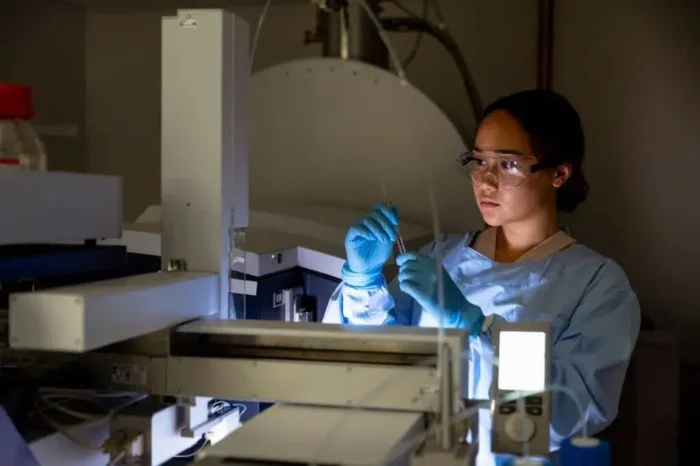Last Updated on January 23, 2025 by II Editor
Choosing a nursing school is an important decision that requires research into program quality, costs, and acceptance rates for those seeking relatively accessible nurse training options in Florida. In this article, we provide an overview of some of the easiest nursing schools to get into in Florida. Factors like GPA and entrance exam scores are weighed, along with program details, to help readers make informed choices.
Technical Definitions for Nursing School Requirements
Before exploring specific school profiles, it’s helpful to define some key terms related to nursing program admission requirements:
GPA (Grade Point Average) – The average of all grades received for courses taken. Nursing programs typically require a minimum cumulative GPA, often between 2.5-3.0 on a 4.0 scale. Higher GPAs indicate stronger academic performance.
TEAS (Test of Essential Academic Skills) – A standardized exam that assesses basic math, science, English and reading comprehension skills. Although most Florida nursing programs require TEAS scores for admission consideration, other nursing schools do not require TEAS tests.
Background Check – A screening of an applicant’s criminal history. Most states, including Florida, mandate background checks prior to nursing licensure due to healthcare roles involving patient safety and privacy. Checks typically look for felony convictions.
Prerequisite Courses – Foundation science and math classes are required before starting clinical nursing courses. Common prerequisites include anatomy, physiology, microbiology, chemistry, college algebra and statistics.
Understanding these common application elements helps benchmark the demands of different nursing programs statewide. Factors like GPA cut-offs, preferred TEAS scores, and course demands vary across schools.
Easiest Nursing Schools to Get into in Florida
Below are some of the easiest nursing schools to get into in Florida.
1. Broward College
- Location: Several campuses across Broward County, FL
- Acceptance Rate: Very high at over 95%
- Minimum GPA: 2.0 cumulative.
- TEAS Requirement: No minimum score is required.
The Associate’s Degree Nursing (ADN) program at Broward College is widely considered one of the most accessible registered nurse (RN) training options in Florida. With an acceptance rate exceeding 95%, qualified applicants face very favorable odds of gaining entry.
Broward College also possesses one of the lowest GPA thresholds statewide at a cumulative 2.0. No minimum TEAS exam result is mandated either. The lack of stringent academic hurdles makes Broward an ideal choice for students with weaker transcripts seeking to enter nursing.
The curriculum follows a traditional 2-year structure with classroom and clinical rotations. Graduates earn an ADN and qualify to take the NCLEX-RN licensing test. Total estimated program costs, including tuition and books, are approximately $6,000-$8,000 for in-state residents. The affordable price point further enhances Broward’s appeal.
However, the ease of entry does come with some risks. Above-average student attrition is common due to less academic filtering of the candidate pool. Support services are in place to help struggling learners succeed, but nursing coursework still demands diligence. Broward maintains professional standards through background checks and drug screenings as well.
Overall, Broward’s ADN program offers a highly accessible on-ramp into registered nursing for students who meet the bare minimum criteria. The low barriers and affordable costs compensate for tougher retention standards down the line.
2. Indian River State College
- Location: Main campus in Fort Pierce, additional sites in Okeechobee, Stuart and Vero Beach.
- Acceptance Rate: Moderate at around 75%
- Minimum GPA: 2.5 cumulative.
- TEAS Requirement: 55% or higher on Composite Score.
Indian River State College (IRSC) has moderately competitive entry thresholds that stop short of more elite programs yet remain above Broward College. The mid-range standards help screen applicants without creating prohibitive hurdles.
A 2.5 cumulative GPA floor establishes a midpoint benchmark typical high school graduates surpass. Meanwhile, a TEAS Composite score of 55% or greater correlates to the basic academic aptitude expected of healthcare professionals. These combined criteria still leave the door open for many qualified candidates.
IRSC’s acceptances run nearly 75% of annual applications, indicating the review process does not overlook promising students with minor weaknesses. Retention is stronger than Broward due to more selective entry filters. Another benefit lies in IRSC’s multi-campus footprint spanning the Treasure Coast region for convenient clinical rotations.
The Associate of Science in Nursing (ASN) degree prepares grads to take the NCLEX-RN exam in about two years. Affordability remains a selling point at estimated program costs from $6,000-$8,000. Overall, IRSC’s ASN program hits a reasonable balance between accessibility and academic standards. The approach retains open pathways while screening out those lacking nursing prerequisites.
3. Daytona State College
- Location: Campuses in Daytona Beach, Deland and other Volusia County cities
- Acceptance Rate: Moderate at around 70%
- Minimum GPA: 2.5 cumulative
- TEAS Requirement: 62% or higher on Composite Score
Like IRSC, Daytona State College maintains admission metrics straddling accessibility and rigor. Its ASN track accepts approximately 70% of applicants through a holistic application review.
Beyond requiring a 2.5 GPA and 62% TEAS score minimum, significant weight is given to healthcare experience, recommendation letters and a written essay. Candidates demonstrating commitment to patient care fare better even if academic marks fall slightly below targets.
Daytona State’s programs emphasize hands-on clinical training through partnerships with local healthcare agencies. Modern medical simulation labs further develop students’ clinical judgement and technical skills. These enriched learning experiences help offset the potential risk of accepting marginally-qualified applicants.
At around $5,000-$7,000 total, ASN program costs compare favorably to private colleges. Daytona State also maintains open admission standards for non-nursing prerequisites to welcome diverse student backgrounds. Its balanced approach to screening applications makes its ASN an obtainable yet worthwhile option.
4. Seminole State College of Florida
- Location: Main campus in Sanford, additional sites in Altamonte Springs, Oviedo and Lake Mary
- Acceptance Rate: Moderate at 60-70%
- Minimum GPA: 2.5 cumulative
- TEAS Requirement: 62% or higher on Composite Score.
Seminole State rounds out the list of Florida community colleges offering moderately accessible nursing programs. Like the previous profiles, its ASN track maintains a middle ground between open access and stringent criteria.
A 2.5 GPA floor and 62% TEAS cut-off keep core prerequisites in check while leaving room for growth-oriented applicants. About 60-70% of candidates gain entry through balanced consideration of academic and non-cognitive factors. Once matriculated, Seminole State supplements lessons with medical simulation labs and clinical immersion.
Program costs clock in around the competitive $5,000-$7,000 range for two years of in-state tuition and expenses. Beyond the degree, Seminole State preps graduates to excel on licensure exams and diverse healthcare settings by emphasizing evidence-based practice, critical thinking and lifelong learning skills.
Seminole State’s ASN program cultivates well-rounded nurses who are ready for evolving patient needs. Its standards-based screening process balances this goal with accessibility for capable candidates desiring an affordable, achievable pathway into the profession.
Private Nursing Colleges in Florida
While community colleges represent the most attainable routes, some marginally selective private nursing schools exist in Florida as well:
- Lynn University (Boca Raton) – Accepts around 75% of applicants with a minimum 3.0 GPA and 60% TEAS. Offers accelerated 14-month BSN—estimated $50,000 total costs.
- Keiser University (Various locations) – Moderate acceptance rate around 65% with 2.5 GPA and 55% TEAS. ASN/BSN programs have May/August start dates—approximately $30,000 overall expenses.
- Florida National University (Hialeah) – Accepts about 50% of candidates provided a 2.5 GPA and 50% TEAS. ASN tuition is around $15,000-$18,000, excluding living costs and fees.
While private college financial burdens can deter many, their slightly less accessible programs still rank amongst the easier nursing schools to enter in Florida relative to most four-year public universities. Hands-on training, flexible schedules and abundant clinical sites also appeal to different student profiles.
Choosing the Best Fit
Florida abounds with reasonably accessible nursing programs tailored to varied qualifications, budgets and career goals. Community colleges especially welcome a broad range of applicants through balanced application reviews.
Top priorities when selecting a school include academic preparedness, financial means, location preferences and individual strengths. Targeting range-appropriate acceptance guidelines and then researching offerings helps identify the best fit. Above all, no single path holds the sole key to becoming a registered nurse. Dedicated students open numerous doors through community college ranks and private colleges equally. With informed choice and perseverance, Florida’s nursing pathways remain among the more achievable in the nation.









